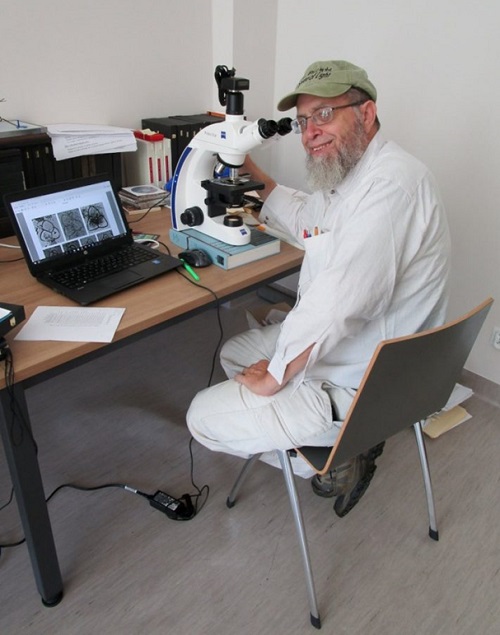The new year means another adventure for Kevin McCartney, Professor of Geology and Environmental Science at the University of Maine at Presque Isle, who is heading to Poland on Jan. 4 after being awarded a prestigious Kosciuszko Fellowship to conduct research in the field of micropaleontology. McCartney will return to Szczecin, Poland, to build on the research he did during the 2016 to 2107 academic year as the first Fulbright Scholar in northern Maine’s history.
The Kosciuszko Foundation was established in 1925 to promote Polish-American activities for students, scholars, and artists, and awards up to $1 million annually in fellowships and grants. The Foundation and Fellowship is named after Tadeusz Kosciuszko, a legendary figure in Poland who was part of George Washington’s staff during the Revolutionary War and later led a revolution in his own country to free the peasants from serfdom and end feudalism. Thomas Jefferson wrote of Kosciuszko, “He is as pure a son of liberty as I have ever known.”
The Kosciuszko Fellowship will facilitate McCartney’s university sabbatical to Poland for the first six months of 2019. This work will continues his longstanding research on the evolution of the silicoflagellates, an important group of microorganisms that live in the modern oceans, and have a geological history that extends to the Age of Dinosaurs.
McCartney has been studying silicoflagellates for 35 years. His detailed work on the evolution of the group began about 10 years ago with a sabbatical at the University of Nebraska-Lincoln. During that sabbatical and for the following half-decade, he has published several papers that present the early evolution of the group. This work includes the description of three new genera, one of which is named after his university: Umpiocha.
During his Fulbright research from September 2016 to May 2017, McCartney studied the evolution of the silicoflagellates during the first 12 million years of the “Age of Mammals.” This has resulted in the recent publication of a significant paper in the international peer-reviewed journal Acta Geologica Polonica, published in Warsaw, Poland. The paper, titled Paleocene-early Eocene Southern subtropical to subpolar silicoflagellate biostratigraphy, is co-authored by a professor and an undergraduate colleague from the University of Szczecin.
Most earlier silicoflagellate study has been from single localities, or several locations in a fairly confined region. For his Fulbright research, McCartney studied five deep-sea drill cores that were widely scattered across the entire southern hemisphere. The ages when species first evolve has been more carefully determined and tied into a refined geologic time scale. The result is a more precise dating of silicoflagellate history than has ever been done before in the important interval of time after the dinosaur extinctions. The paper includes descriptions for a new genus and two new species.
McCartney’s Kosciuszko study will cover a similarly large portion of the Earth’s oceans and about 25 million years of geologic history. While there, he will be further developing the silicoflagellates as a tool for the age dating of ocean sediment, through a process known as biostratigraphy. This new study, combined with what he learned in his Fulbright research, should enable him to further develop the detailed examination of silicoflagellate evolution that he has been engaged in for many years.
McCartney said his work in Poland fulfills a goal he set for himself in fourth grade—to grow up to make serious contributions as a scientist. He now has 65 peer-reviewed papers in prestigious journals, and has described six genera and more than 20 new species. He also interacts regularly with scientists from around the world as he works to build a better understanding of the diverse organisms that live in the world’s oceans.
To follow McCartney’s adventures during this research fellowship, visit his photoblog.
